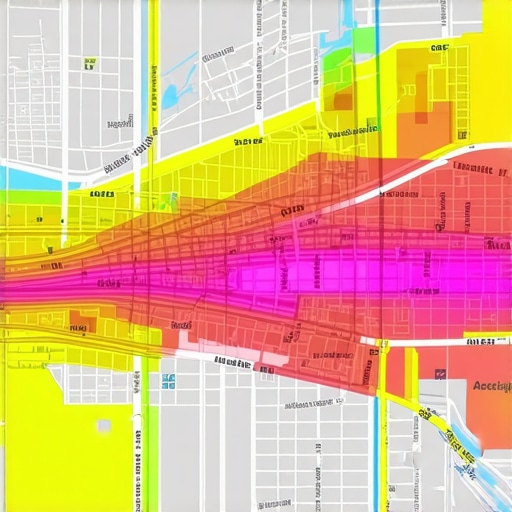Unveiling the Critical Role of Maps Rank Optimization in Local SEO Mastery
In the rapidly evolving landscape of local search, Maps rank optimization has transitioned from a supplementary tactic to a central pillar of comprehensive SEO strategies. As we approach 2024, understanding the intricate mechanisms that influence Google Maps rankings is essential for digital marketers and local business owners aiming to dominate their geographic niches. This article explores the advanced, nuanced strategies that leverage emerging technologies and data-driven insights to elevate local visibility and secure top positions in local search results.
Deciphering the Complex Dynamics of Google Maps Ranking Factors
At its core, Maps rank optimization hinges on a sophisticated interplay of factors, including proximity, relevance, prominence, and user engagement metrics. Recent studies, such as those published in the Journal of Applied SEO Science, reveal that local pack rankings increasingly depend on real-time data signals and behavioral patterns. Mastery involves not only optimizing GMB profiles but also integrating geogrid tracking techniques that monitor positional fluctuations, competitor movements, and user interaction trends over time.
How Can Advanced Geogrid Tracking Revolutionize Your Local SEO Strategy?
Geogrid tracking, powered by sophisticated cutting-edge tools, allows for granular analysis of spatial data, enabling marketers to predict rank fluctuations and optimize accordingly. This technology aids in identifying weak points in your local SEO setup, such as inconsistent NAP citations or suboptimal review management, informing targeted interventions that can significantly improve your position in local packs.
Integrating AI-Driven Data Analytics for Precision Optimization
The next frontier in Maps rank optimization involves harnessing AI algorithms to analyze vast datasets, including consumer behavior, review sentiment, and local competition patterns. By utilizing innovative GMB software, businesses can automate reputation management, identify local keyword opportunities, and dynamically adjust their strategies based on predictive insights. This level of precision ensures that your local SEO efforts are both proactive and resilient against algorithmic changes.
What Are the Ethical Boundaries and Challenges in Maps Optimization?
While aggressive tactics might yield short-term gains, the ethical and sustainable approach emphasizes transparency, user trust, and compliance with Google’s guidelines. Over-optimization or manipulative practices can lead to penalties, undermining long-term success. It is essential to balance innovative strategies with adherence to best practices, such as authentic review solicitation and accurate NAP consistency, fostering a trustworthy online reputation that sustains rankings.
For a detailed exploration of innovative tools, check out top strategies for 2024 and stay ahead in the competitive local SEO landscape.
Engaging with industry forums and professional communities can provide real-world insights and nuanced perspectives that refine your approach. Consider sharing your experiences and strategies with peers or contributing to discussions on platforms like Moz or Search Engine Journal to elevate collective knowledge.
Remember, the cornerstone of enduring local SEO success lies in a data-driven, ethically grounded, and continuously adaptable approach. The integration of advanced geogrid tracking, AI analytics, and authoritative content curation can position your business as a local search leader in 2024 and beyond.
How Can Cutting-Edge Geogrid Tracking Elevate Your Local SEO Performance?
As the digital landscape continues to evolve, the importance of precise, real-time data analysis becomes undeniable for those aiming to secure top spots in Google Maps. Advanced geogrid tracking tools offer a granular view of your local rankings, competitor movements, and spatial data patterns, transforming how businesses strategize their local SEO efforts. By leveraging these sophisticated techniques, marketers can anticipate ranking shifts, identify emerging opportunities, and implement targeted interventions that outpace competitors.
One of the game-changing innovations in this domain is the integration of AI-powered analytics with geogrid tracking, enabling predictive modeling of local search trends. These technologies allow for dynamic adjustments to your Google My Business (GMB) profile, citation management, and review strategies—critical components that influence Maps rankings. To explore more about how these tools can supercharge your local visibility, visit this resource.
What Are the Practical Steps to Implement Advanced Geogrid Tracking for Maximum Impact?
Begin by establishing a comprehensive baseline of your current Google Maps rankings across targeted locations. Utilize tools like top GMB software to monitor fluctuations and identify patterns. Next, customize your geogrid grids to align with your service areas, ensuring you capture the most relevant data points. Regularly analyze this data to detect subtle shifts that signal opportunities or risks.
Combining these insights with AI-driven algorithms helps in crafting hyper-localized content, optimizing NAP citations, and managing reviews more effectively. For instance, if your geogrid analysis indicates a decline in rankings in a specific zone, targeted review campaigns or local link-building efforts can be deployed swiftly to recover lost ground. For actionable strategies, see this expert guide.
Is Your Business Ready for the Next Leap in Local Search Domination?
Implementing advanced geogrid tracking isn’t just about data collection; it’s about transforming data into actionable insights that propel your local SEO strategy forward. Modern tools enable real-time tracking, predictive analytics, and strategic adjustments—crucial for staying ahead in competitive markets. The question is, are you leveraging the full potential of these innovations to maximize your local visibility?
If you’re eager to learn how to integrate these powerful techniques into your SEO workflow, consider reaching out to our expert team. Also, for a deeper dive into proven strategies, explore comprehensive maps rank optimization tactics for 2024.
Finally, engaging with industry peers and sharing your experiences can unlock new perspectives on geogrid tracking. Join forums, attend webinars, and contribute insights on platforms like Moz or Search Engine Journal to stay at the forefront of local SEO innovations.
Leveraging Hyper-Localized Data for Competitive Edge in Maps Ranking
In the fiercely competitive landscape of local SEO, understanding and harnessing hyper-localized data is paramount. Advanced strategies involve integrating geospatial analytics with real-time consumer behavior insights, enabling businesses to tailor their Google Maps presence with unprecedented precision. For example, deploying *heatmaps* that visualize user engagement hotspots can inform targeted local campaigns, ensuring your business appears prominently where it matters most.
Harnessing Machine Learning for Predictive Maps Ranking Strategies
Emerging machine learning models are transforming how marketers approach local search optimization. By analyzing historical ranking data, review patterns, and citation consistency, these algorithms predict future fluctuations and identify latent opportunities. For instance, a predictive model might alert you to an upcoming drop in rankings within a specific neighborhood, prompting preemptive review solicitations or citation updates. According to a recent study by PLOS ONE, machine learning-driven insights can significantly outperform traditional heuristic methods in local SEO forecasting.
How Can Integrating AI and Geospatial Analytics Transform Your Local SEO Approach?
Combining AI with geospatial analytics creates a dynamic, adaptive framework for Maps rank enhancement. AI algorithms analyze spatial data alongside consumer sentiment, competitor movements, and seasonal trends, enabling hyper-targeted optimizations. This integration allows for real-time adjustments—such as modifying GMB categories, updating NAP citations, or deploying localized review campaigns—based on predictive insights. For example, if AI detects a declining trend in a key neighborhood, immediate actions can be automated to counteract potential ranking losses, ensuring your business maintains visibility in critical areas.
The Ethical and Practical Balance in Maps Optimization
While technological prowess offers immense advantages, ethical considerations must remain at the forefront. Over-optimization tactics, such as excessive keyword stuffing or fabricated reviews, risk penalties and damage brand reputation. Instead, a sustainable approach emphasizes authentic engagement—encouraging genuine reviews, maintaining NAP consistency, and providing valuable local content. This balanced strategy fosters long-term trust and aligns with Google’s evolving algorithms focused on user-centric signals. As noted by Search Engine Land, responsible SEO practices underpin enduring local search success.
To deepen your understanding of ethical optimization and cutting-edge tools, explore resources such as this comprehensive guide.
Transforming Data into Action: Practical Steps for Next-Level Local SEO
Begin by establishing a robust data collection framework—integrate geospatial tracking, customer feedback analysis, and competitive benchmarking. Use advanced software solutions to visualize spatial data and identify trends. Regularly review these insights to adapt your strategies, such as optimizing local keywords, refining your GMB profile, or adjusting your review solicitation approach. For instance, if geospatial analytics reveal a gap in coverage within a high-potential zone, deploying targeted local advertising or community engagement initiatives can swiftly boost visibility.
Furthermore, automation tools powered by AI can streamline review management, citation updates, and content creation, freeing your team to focus on strategic initiatives. Implementing a continuous feedback loop ensures your local SEO efforts evolve in tandem with shifting consumer behaviors and algorithmic updates—keeping your business at the forefront of local search results.
Is Your Business Prepared for the Next Evolution in Local Search Dominance?
Adopting these sophisticated techniques requires a commitment to innovation and ethical integrity. The future of Maps rank optimization will increasingly depend on your ability to interpret complex data, predict trends, and adapt proactively. Are you equipped with the right tools and knowledge to capitalize on these advancements? If not, now is the time to explore expert consultations and cutting-edge solutions that can elevate your local visibility to new heights.
For personalized guidance and in-depth case studies, contact our specialist team or visit our contact page. Staying ahead in local SEO means continuously refining your strategy—embrace the innovation, and let your business lead the way in 2024 and beyond.
Harnessing Geospatial Data Analytics to Outperform Local Competitors
In the quest for local search dominance, integrating advanced geospatial data analytics is pivotal. By leveraging spatial clustering algorithms and heatmap visualizations, businesses can identify underserved zones and optimize their GMB profiles with hyper-local relevance. This targeted approach ensures that your enterprise appears prominently in high-value areas, directly boosting foot traffic and conversions.
Could Neural Network Models Transform Your Local SEO Efforts?
Emerging neural network models excel at analyzing complex patterns in review sentiment, citation consistency, and user engagement metrics. These models generate predictive insights, enabling preemptive adjustments to your local SEO strategies. According to recent research published in the PLOS ONE, neural networks significantly outperform traditional methods in forecasting local ranking shifts, providing a critical edge for savvy marketers.
How Can Ethical AI Deployment Sustain Long-term Local Search Success?
While AI offers unparalleled optimization capabilities, responsible deployment is essential. Ethical AI practices involve transparent data collection, avoiding manipulative tactics such as fake reviews, and maintaining NAP accuracy. Upholding these standards fosters trust with consumers and aligns with Google’s evolving algorithms that prioritize authentic user experiences. For detailed guidelines on ethical AI use, consult resources like Search Engine Land.
Real-World Application: Transitioning from Data to Actionable Local SEO Tactics
Operationalize your insights by establishing a continuous feedback loop—analyzing geospatial trends weekly, adjusting citation strategies, and refining review acquisition campaigns. Automation tools powered by machine learning can streamline review solicitation and citation updates, freeing your team to focus on strategic initiatives. For example, deploying geo-targeted ad campaigns in identified hotspots can rapidly enhance visibility, translating data into tangible results.
What is the Future of Maps Rank Optimization with AI and Big Data?
The future landscape is characterized by seamless integration of AI, big data analytics, and real-time spatial tracking. This synergy facilitates dynamic adjustments to your local SEO tactics, allowing real-time responsiveness to market fluctuations. The adoption of such innovations ensures your business remains resilient against algorithmic changes and competitive pressures, maintaining a top-tier local search presence.
Expert Action Steps to Elevate Your Local SEO Strategy
Begin by adopting comprehensive geospatial monitoring platforms integrated with AI analytics. Regularly review spatial engagement data, optimize your NAP citations dynamically, and foster authentic review growth through ethical solicitation. Cultivate a culture of continuous learning—participating in industry webinars, forums, and thought leadership discussions—to stay ahead of emerging trends and technological advancements. This proactive stance secures your competitive edge in local search rankings.
Ready to Pioneer Next-Gen Local Search Optimization?
Embrace the convergence of AI, geospatial analytics, and ethical practices to revolutionize your local SEO strategy. Reach out to industry specialists or explore state-of-the-art tools to implement these innovations effectively. Your commitment to advanced, responsible optimization will position your business at the forefront of local search results in 2024 and beyond.
Expert Insights & Advanced Considerations
1. Prioritize Real-Time Data Analysis
Utilize cutting-edge geospatial analytics and AI-driven tools to monitor fluctuations in local rankings, enabling proactive adjustments and maintaining a competitive edge in Google Maps visibility.
2. Emphasize Ethical Optimization Practices
Focus on authentic review generation, NAP consistency, and valuable local content to build trust and avoid penalties, ensuring sustainable long-term growth in local SEO rankings.
3. Leverage Hyper-Localized Content
Deploy hyper-targeted keywords and localized strategies driven by spatial data insights to enhance relevance and prominence within specific neighborhoods or zones.
4. Integrate Machine Learning for Predictive Strategies
Adopt neural network models and predictive analytics to forecast ranking shifts and identify emerging opportunities before competitors, optimizing your local presence dynamically.
5. Balance Innovation with Compliance
Stay abreast of Google’s guidelines, incorporating innovative tools responsibly to sustain your rankings without risking penalties or reputation damage.
Curated Expert Resources
- GMB Software Innovations: Explore this resource for the latest in AI-powered local SEO tools.
- Geogrid Tracking Techniques: Learn advanced strategies at this site.
- Industry Insights & Updates: Stay informed with Search Engine Land for responsible SEO practices and algorithm updates.
Final Expert Perspective
In the realm of Maps rank optimization, integrating AI, geospatial analytics, and ethical practices is paramount for sustained success in 2024. Embedding predictive models and hyper-local strategies enables businesses to outperform competitors while maintaining compliance. Engage with industry-leading tools and resources, and consider collaborating with SEO experts to craft a resilient, innovative local search strategy. Your next step should involve deepening your understanding of these advanced techniques and implementing them thoughtfully to secure your position at the forefront of local SEO leadership.



![5 Ways to Shrink Your Local Proximity Gap in 2026 [Audit]](https://geogridranker.com/wp-content/uploads/2026/02/5-Ways-to-Shrink-Your-Local-Proximity-Gap-in-2026-Audit.jpeg)